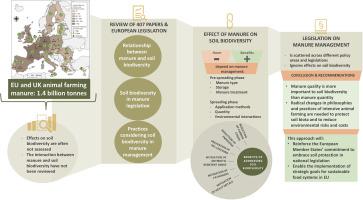Agricultural Systems ( IF 6.1 ) Pub Date : 2021-09-08 , DOI: 10.1016/j.agsy.2021.103251 Julia Köninger 1, 2 , Emanuele Lugato 2 , Panos Panagos 2 , Mrinalini Kochupillai 3 , Alberto Orgiazzi 2 , Maria J.I. Briones 1

|
CONTEXT
In the European Union (EU-27) and UK, animal farming generated annually more than 1.4 billion tonnes of manure during the period 2016–2019. Of this, more than 90% is directly re-applied to soils as organic fertiliser. Manure promotes plant growth, provides nutritious food to soil organisms, adds genetic and functional diversity to soils and improves the chemical and physical soil properties. However, it can also cause pollution by introducing toxic elements (i.e., heavy metals, antibiotics, pathogens) and contribute to nutrient losses. Soil organisms play an essential role in manure transformation into the soil and the degradation of any potential toxic constitutes; however, manure management practices often neglect soil biodiversity.
OBJECTIVE
In this review, we explored the impact of manure from farmed animals on soil biodiversity by considering factors that determine the effects of manure and vice versa. By evaluating manure's potential to enhance soil biodiversity, but also its environmental risks, we assessed current and future EU policy and legislations with the ultimate aim of providing recommendations that can enable a more sustainable management of farm manures.
METHODS
This review explored the relationship between manure and soil biodiversity by considering 407 published papers and relevant legislative provisions. In addition, we evaluated whether benefits and risks on soil biodiversity are considered in manure management. Thereafter, we analysed the current legislation in the European Union relevant to manure, an important driver for its treatment, application and storage.
RESULTS AND CONCLUSIONS
This review found that coupling manure management with soil biodiversity can mitigate present and future environmental risks. Our analyses showed that manure quality is more important to soil biodiversity than manure quantity and therefore, agricultural practices that protect and promote soil biodiversity with the application of appropriate, high-quality manure or biostimulant preparations based on manure, could accelerate the move towards more sustainable food production systems. Soil biodiversity needs to be appropriately factored in when assessing manure amendments to provide better guidelines on the use of manure and to reduce costs and environmental risks. However, radical changes in current philosophies and practices are needed so that soil biodiversity can be enhanced by manure management.
SIGNIFICANCE
Manure quality in the EU requires greater attention, calling for more targeted policies. Our proposed approach could be applied by European Union Member States to include soil protection measures in national legislation, and at the EU level, can enable the implementation of strategic goals.
中文翻译:

粪便管理和土壤生物多样性:欧盟实现更可持续的粮食系统
语境
在欧盟(EU-27)和英国,2016-2019 年期间,畜牧业每年产生超过 14 亿吨粪便。其中,90%以上直接作为有机肥重新施用于土壤。粪便促进植物生长,为土壤生物提供营养食物,增加土壤的遗传和功能多样性,并改善土壤的化学和物理特性。然而,它也可能通过引入有毒元素(即重金属、抗生素、病原体)而造成污染,并导致养分流失。土壤生物在粪便转化为土壤和任何潜在有毒成分的降解方面发挥着重要作用;然而,粪便管理做法往往忽视土壤生物多样性。
客观的
在这篇综述中,我们通过考虑决定粪便影响的因素来探讨养殖动物粪便对土壤生物多样性的影响,反之亦然。通过评估粪便增强土壤生物多样性的潜力及其环境风险,我们评估了当前和未来的欧盟政策和立法,最终目的是提供建议,以实现更可持续的农场粪便管理。
方法
本综述通过考虑 407 篇已发表的论文和相关立法规定,探讨了粪便与土壤生物多样性之间的关系。此外,我们评估了粪便管理中是否考虑了土壤生物多样性的收益和风险。此后,我们分析了欧盟当前与粪便相关的立法,粪便是其处理、应用和储存的重要驱动因素。
结果和结论
该审查发现,将粪便管理与土壤生物多样性相结合可以减轻当前和未来的环境风险。我们的分析表明,对于土壤生物多样性而言,粪便质量比粪便数量更重要,因此,通过应用适当的、高质量的粪便或基于粪便的生物刺激剂制剂来保护和促进土壤生物多样性的农业实践,可以加速朝着更可持续的方向迈进。食品生产系统。在评估粪便修正时需要适当考虑土壤生物多样性,以提供更好的粪便使用指南并降低成本和环境风险。然而,需要彻底改变当前的理念和做法,以便通过粪便管理来增强土壤生物多样性。
意义
欧盟的粪便质量需要更多关注,需要更有针对性的政策。我们提议的方法可以被欧盟成员国应用,将土壤保护措施纳入国家立法,并在欧盟层面实现战略目标。











































 京公网安备 11010802027423号
京公网安备 11010802027423号